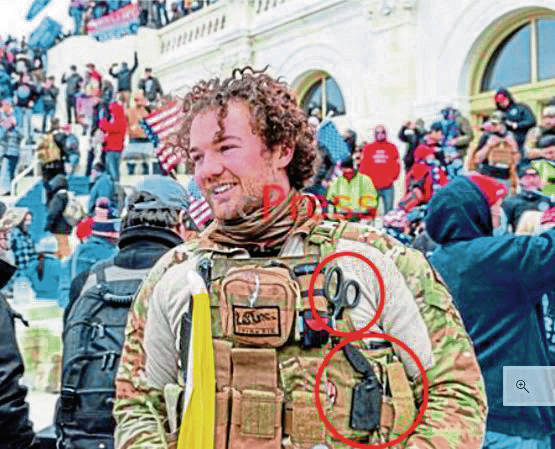A federal judge will rule on Tuesday whether a substitute teacher at the Shaler Area Middle School ought to be released on bond pending trial for his involvement in the Jan. 6 Capitol attacks.
On Wednesday, U.S. Magistrate Judge G. Michael Harvey, in Washington, D.C., heard argument from the federal prosecutor why Robert Morss should be considered both a danger to the community and a flight risk, while Morss’ defense attorney said that there are conditions of release that make incarceration unnecessary, especially given the prosecution’s exaggeration of her client’s actions that day.
Morss, 27, of Glenshaw, is a former Army Ranger, who graduated from Penn State University in December. On Tuesday, Harvey presided over his detention hearing. It was continued until Wednesday for argument.
Morss is charged with assault, resisting or impeding officers, civil disorder, robbery of personal property of the United States — for taking a shield and attempting to steal a baton and fencing from officers — and obstruction of an official proceeding.
RIGHT NOW: Prosecutors are arguing to hold Jan 6 defendant Rob Morss in jail. Morss is accused of having military gear & being part of multiple fronts of assault vs police
Feds say Morss tried to "rob" baton and shield from officer's hands, engaged in violence for 2+ hours pic.twitter.com/TLLJKvAh7f
— Scott MacFarlane (@MacFarlaneNews) July 14, 2021
According to the criminal complaint in the case, Morss can be seen in video trying to breach police lines, including organizing a shield wall with other rioters in a violent attack on officers inside the Lower West Tunnel of the Capitol.
He is visible trying to grab an officer’s baton, and trying to take an officer’s helmet visor, investigators said.
On Wednesday, Assistant U.S. Attorney Melissa Jackson told the court that Morss acted as a leader during the attack that day.
“He didn’t just get caught up in a moment,” she said.
It wasn’t a 15-second decision — instead, Jackson continued, Morss spent more than two hours attempting to breach the Capitol and in confrontations with police officers there.
“During those 2-1/2 hours, he repeatedly engaged in violent acts with those officers,” the prosecutor said. “He appears to have put his military training to use that day. He acted as an organizer and a leader.
“He talked about being bold and having to be prepared for anything.”
Despite having served honorably in the Army, Jackson said, Morss “showed a blatant disregard for the law and our government.”
Jackson noted, too, that Morss wore a tactical vest with plates, carried scissors and a knife — although he was not seen using them. After Morss’ arrest, she continued, investigators found a notebook with his belongings in which the defendant wrote about methods to organize a militia.
Jackson told the court that text messages Morss sent after the Capitol insurrection show he thought about fleeing to avoid arrest.
In messages the prosecutor read to the court, Morss wrote on Jan. 24: “I’m freaking out dude. I think it’s only a matter of time before ‘ramifications’; of the 6th come down on me. I’ve been watching and reading [stuff] all night. People from Centre County, Pittsburgh, Philly have already been hunted down and arrested.”
Then, he continued, “I feel ice cold inside. I want to make a positive difference in life and show affection and belief to these kids who I will inevitably teach some day and I’m begging God that I am still able to do that with my life. If not I’m completely screwed.”
Defense attorney Kathleen Gaughan argued that those messages indicated regret.
“They express remorse — legitimately a fear — of him somehow being arrested,” she said. “He made no attempts to leave.”
But Jackson disagreed, noting that the text messages never say “‘I wish I hadn’t done this.’
“This is, ‘oh, man, the future I planned for myself has been derailed.’ It’s ‘I’m going to get caught, and it’s ruining me. I hope I don’t get caught.’”
Gaughan told the court that her client took no leadership role during the riot, and that Jackson was overstating what video from that day showed.
She argued that nothing showed Morss physically assaulting any officers.
“There’s absolutely no suggestion from that video his intention was to harm anyone,” Gaughan said.
She acknowledged that there were others in the crowd who had hand-to-hand combat with officers, but her client was not one of them.
Harvey asked the government to provide him with the video of Morss’ actions that day for him to review.
In asking for her client’s release, Gaughan told the court that Morss ought to be treated like the co-defendants identified in his case — most of whom were granted pre-trial release.
Harvey said he would review the others’ cases prior to reaching his ruling.
“I feel obligated that my decision is consistent with the defendant’s co-defendants,” he said.








